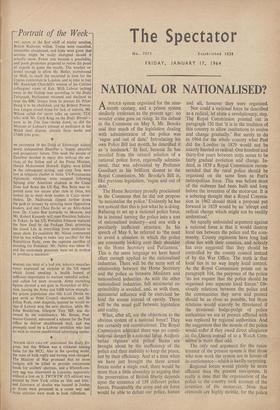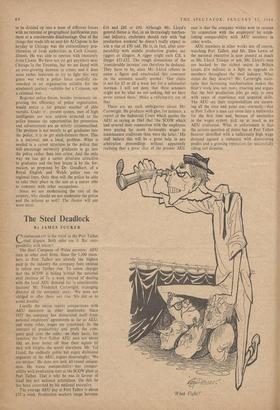NATIONAL OR NATIONALISED?
A POLICE system organised for the nine-
teenth century, and a prison system similarly irrelevant to the present age: no wonder crime goes on rising. In the debate in the Commons on May 9, Mr. Brooke said that much of the legislation dealing with administration of the police was 'vague and out of date.' Introducing his own Police Bill last month, he described it as 'a landmark.' In fact, because he has recoiled from the natural solution of a national police force, regionally adminis- tered, that was advocated by Professor Goodhart in his brilliant dissent to the Royal Commission, Mr. Brooke's Bill is, like previous legislation, 'vague and out of date.'
The Home Secretary proudly proclaimed in the Commons that he did not propose `to nationalise the police.' Evidently he has not noticed that this is just what he is doing. Refusing to set up a national police force, he is instead turning the police into a sort of nationalised industry—and one with a peculiarly inefficient structure. In his speech of May 9, he referred to 'the need to avoid a situation in which the police are constantly looking over their shoulder to the Home Secretary and. Parliament.' This is the same language we have heard often enough applied to the nationalised industries. There, will be the same sort of relationship between the Home Secretary and the police as between Ministers and nationalised industries. As with the other nationalised industries, full ministerial re- spcinsibility is avoided, and, as with them, ministerial influence will be exercised be- hind the scenes instead of openly. There will be the usual gulf between legislation and reality.
What, after all, are the objections to the obvious system of a national force? They are certainly not constitutional. The Royal Commission admitted there was no consti- tutional danger in a national f9,ree. Aut,hori- tarian regimes and police States are brought about by the inefficiency of the police and their inability to keep the peace, not by their efficiency. And at a time when we have just brought the three armed forces under a single roof, there would be more than a little absurdity in arguing that the preservation of British liberty depends upon the existence of. 158 different police forces. Presumably the army and air force would be able to defeat our police, horses and all, however they were organised.
Nor could a national force be described as a radical, let alone a revolutionary, step. The Royal Commission pointed out in paragraph 150 that 'it is in the tradition of this country to allow institutions to evolve and change gradually.' But surely to do in 1964 for the whole country what Peel did for , London in• 1829 would not be exactly hurried or radical. One hundred and thirty-five years between steps seems to be fairly gradual evolution and change. In- deed, in 1839 a Royal Commission recom- mended that the rural police should be organised on the same lines as Peel's metropolitan force. This was before most of the railways had been built and long before the invention of the motor-car. It is a sobering thought that a Royal Commis- sion in 1962 should think a proposal put forward in 1839 would be an 'abrupt and radical change which might not be readily understood.'
An equally unfounded argument against a national force is that it would destroy local ties between the police and the com- munity. County regiments have long had close ties with their counties, and nobody has ever suggested that they should be controlled by the county council instead of by the War Office. The truth is that local ties in no way imply local control. As the Royal Commission points out in paragraph 104, the purposes of the police `do not require that the police should be organised into separate local forces.' Ob- viously relations between the police and the communities they serve and protect should be as close as possible, but those relations would scarcely be threatened if the irrational hodge-podge of police authorities we are at present afflicted with was replaced by regional authorities. And the suggestion that the morale of the police would suffer if they owed direct allegiance to the., Queen instead of to a Watch Com- mittee is more than odd.
The only real argument for the main- tenance of the present system is that those who now work the system are in favour of its continuance—which is hardly surprising.
Regional forces would plainly be more efficient than the present non-system. It really is time that the organisation of the police in the country took account of the invention of the motor-car. Now that criminals are highly mobile, for the police
to be divided up into a mass of different forces with no rational or geographical justification puts them at a considerable disadvantage. One of the things that made life so easy for Al Capone in his heyday in Chicago was the extraordinary pro- liferation of local authorities in Cook County, Illinois. He was able to operate with immunity from Cicero. We have not yet got anywhere near Chicago in the Twenties, but we are faced with an ever-growing increase in crime; and it does seem rather ludicrous to try to fight this very grave war with a police force carefully en- trenched in an organisation suitable for the nineteenth century—suitable for a Crimean, not a criminal, war.
Regional police forces, besides immensely im- proving the efficiency of police organisation, would entice a far greater number of able recruits. Under a_ present system, men of high intelligence are now seldom attracted to the police because the opportunities for promotion and advancement are so strictly circumscribed. The problem is not merely to get graduates into the police, it is to get sixth-formers there. This is a national, not a local, problem. What is needed is a career structure in the police that will encourage university graduates to go into the police rather than into crime. And the only way we can get a career structure attractive to graduates and the best brains is by the for- mation, as proposed by Dr. Goodhart, of a Royal English and Welsh police run on regional lines. Only then will the police be able to take their place in the sun as a career able to compete with other occupations. .
Since we are modernising the rest of the country, why should we not modernise the police and the prisons as well? The chance will not soon recur.



































 Previous page
Previous page